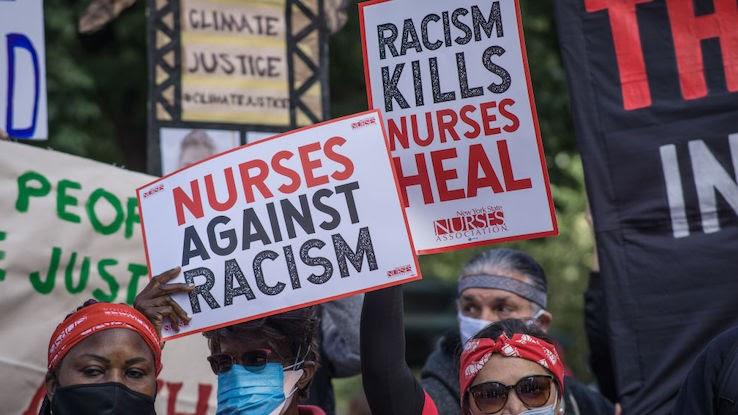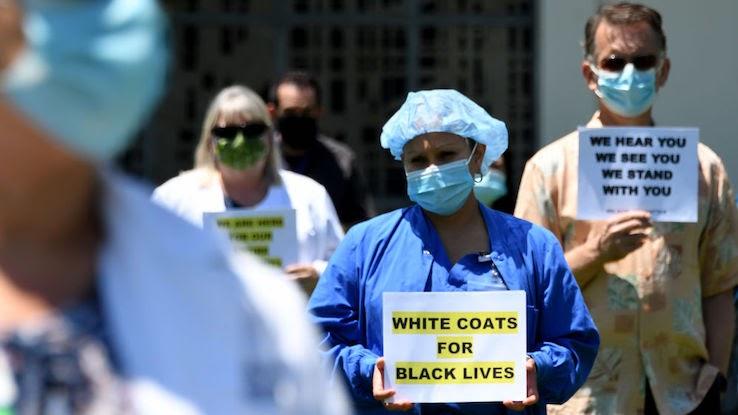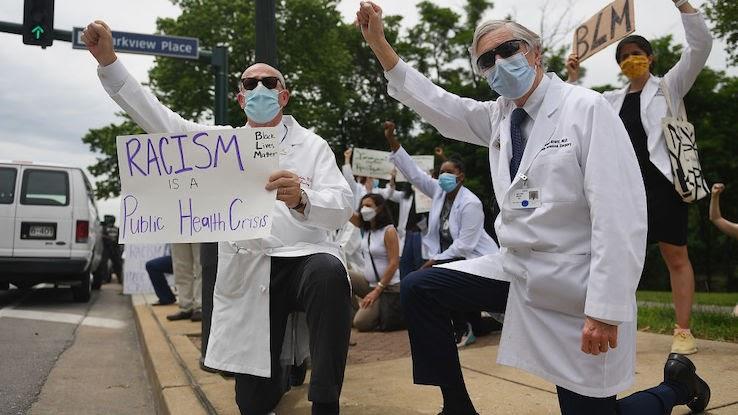Who Thought This Was a Good Idea Book Review

On November 16, 2020, the American Medical Association (AMA) officially designated racism a public wellness threat. Every bit the land's largest group of physicians and medical professionals, the AMA aims to promote the "betterment of public wellness," and information technology found that racism results in major discrepancies in the quality of care white people and people of color receive. This annunciation is a meaningful one in large function because it's official recognition from a respected leader at the superlative level of the healthcare industry. And it's coming from the level where, when changes are fabricated, there's greater potential for far-reaching, positive shifts that could more than thoroughly combat the celebrated marginalization of people of colour and their treatment in the healthcare sphere.
During a year when we've had the privilege of witnessing what rapidly grew into the largest civil rights movement in American history — a motion that's seen millions of people come together to demand deep, lasting alter and racial justice — many of us have realized the importance of actively working to combat racism in all forms. In doing then, it'due south essential that we take the fourth dimension to learn well-nigh the roles gild's biggest institutions play in impacting the lives of people of colour.
The AMA is ane of these institutions, and its contempo announcement could help bulldoze long-overdue change. Yeah, it'll take time to begin implementing and facilitating policies that'll pb to those changes. But as that process finds its footing, it's important to gain a deeper understanding of the potential these changes have, along with how the AMA intends to pursue them.
Racism Has Long Been Responsible for Negative Health Outcomes
Why is it such a big footstep for the AMA to make this statement in the first place? Information technology's a potentially substantial effort to correct the long-term, historical inequalities that have affected people of color's access to healthcare and determined the poorer wellness outcomes they feel as a outcome of treatment. Discriminatory attitudes in the medical community — along with overarching ideas about how a person'due south race could affect their wellness — continue to negatively influence the care unlike groups receive. In addition to implicit bias, overtly racist ideas that are securely ingrained in healthcare every bit a system put people of color at greater hazard for contracting illnesses and subject them to less effective treatments than those white people receive.

All of this to say, racism can touch a person's mental and physical health in innumerable ways. Blackness people have lower life expectancies than white and Latinx people overall, and they're at much higher risk of developing health weather like high blood pressure, obesity and Type 2 diabetes. In the United States, Blackness and Indigenous babies are more than likely than white infants to die in their starting time year of life, and, according to the U.S. National Library of Medicine, meaning parents in those groups are "three to iv times more than likely to die from pregnancy-related causes." Additionally, experiencing racism is associated with higher rates of depression, anxiety and other mental health conditions, especially amid Asian-American and Latinx populations. And this year, Vox reports that Black Americans are likewise dying from COVID-19 at twice the rate of white Americans.
These statistics are striking. Just they illustrate the pervasiveness of racist ideas that exist in the medical community, thus creating lower quality of life for people of colour. Those higher risk levels aren't due to any biological differences between races — an idea that's been debunked countless times just still persists. Instead, people of color really receive unlike medical treatment that ends upwardly elevating their adventure levels.
"It's a holdover from the days of slavery," said Dr. Jennifer Lincoln, an OB-GYN from Portland, Oregon, referencing a time when doctors perpetuated wrong beliefs about Blackness folks' hurting tolerance and other physical attributes to justify the dehumanizing handling of enslaved people. In fact, a 2016 written report establish that half of white medical students even so think Black people feel less pain than people of other races, which leads to underprescription of necessary pain medications. That these unfounded and racist ideas have persisted this long demonstrates exactly why there'due south a need for non only the AMA's announcement but for real action.
The AMA's Declaration Takes a Holistic Approach to Addressing Racism in Healthcare
In June of 2020, the AMA made a pledge in response to the growing protests and calls for sweeping social reform that swelled after the May 25 police murder of George Floyd. In this document, the medical organization'southward board of trustees committed to have "activeness to confront systemic racism and police brutality," which information technology recognized every bit urgent public health threats. Also included in the pledge was the AMA's promise to "actively piece of work to dismantle racist and discriminatory policies and practices across all of healthcare" — to intentionally create equitable conditions and opportunities and so people of color tin can do good from higher-quality medical care than what they've been receiving.

It's becoming clearer that this pledge wasn't something performative or a surface-level effort for the AMA to align itself with a movement just to boost its ain reputation. The November statement demonstrates that, due largely to the framework it sets up and the actionable steps information technology outlines for timely implementation. In addition to recognizing that race is a social construct — meaning it's a concept created past people, not something based on biological differences that tin can be medicalized — the argument as well provides "a detailed plan to mitigate [racism'south] effects" and "dismantl[e] racist and discriminatory policies across all of healthcare."
Then how does the AMA plan to reach this, and what steps will it accept? The organisation proposes activity on multiple levels. First, information technology plans to encourage structural-level change by advocating for government agencies and nonprofit groups to brainstorm funding more research on the extent of the impairment racism causes in healthcare. In add-on, it'll push for more thorough research into ways to both repair and foreclose those damages. The AMA also plans to encourage educational institutions to develop programs that teach medical students about the causes and furnishings dissimilar types of racism have on diverse groups — along with ways to prevent racism'due south negative health effects and to improve health outcomes for the future.
In addition to using its influence to encourage other entities to take activeness, the AMA intends to follow a process its Firm of Delegates — the grouping's policy-making torso — has outlined to lead past example. Included on this listing of steps? The AMA will "identify a set of current best practices" for healthcare institutions, medical offices and hospitals at universities that make information technology easier for these entities to "recognize, address and mitigate the effects of racism on patients, providers" and other populations. Essentially, the organization will create guidelines that give medical professionals on a variety of levels concrete procedures to follow — a sort of roadmap to directly changes and remove barriers to implementing those changes. Finally, the AMA plans to collaborate with a multifariousness of other medical associations to decide which elements of board examinations and medical education programs teach or reinforce racism then that these elements can be addressed.
Is Information technology Enough to Spark Modify?
Of course, the AMA's new recommendations are preliminary, not sweeping. They're somewhat broad, and they seem to involve ample "encouraging" of other entities, which admittedly feels a bit amorphous. But it's important to remember that this is just the beginning of a procedure that'southward going to have time. Systemic racism has been entrenched in American healthcare for centuries, and it's not going to vanish correct away. But the new policies the AMA has presented do have the potential to propel widespread change and serve equally springboards for other organizations.

The early general consensus among the medical community and other healthcare leaders is that the proclamation is a positive step. Dr. Ravi K. Perry, the chair of political scientific discipline at Howard University and a member of the American Lung Association's COVID-19 advisory console, told USA Today, "I retrieve information technology has the potential to exist a game-changer," explaining how "the AMA's declaration could be a meaning catalyst in the progress of national racial dialogue and policy development to fight disparities." Speaking to Business Insider, Dr. Jessica Shepherd, a Dallas-based obstetrician and the founder of online health forum Her Viewpoint, noted that "it'south important for organizations [to] have responsibility for making changes like these, rather than leaving the onus on individuals," just that she'southward been pleasantly surprised with how far things have come up — and how far they might go if other groups continue to do this necessary work.
Dr. Jose Torradas, a doctor of emergency medicine and creator of the bilingual toolkit COVID-nineteen@home, took a more cautiously optimistic stance — one that does feel more appropriate this early on on. "Meaningful touch happens when words become action," said Dr. Torradas. "Our asymmetric approach to public wellness…has taken form over decades, and change won't happen overnight." And he raises an of import point. At this phase — without anything however put into motion aside from a(n admittedly significant) proclamation — it remains to be seen what actual lasting changes might stem from the AMA's proposed policies.
But the official designation of racism every bit a public health threat in and of itself is a vital step. Information technology shows formal, high-level acknowledgement of the life-threatening dangers racist belief systems pose — that leaders are enlightened something needs to modify and are preparing to do something well-nigh it. It shows recognition from the same systemic level that'south and so long been responsible for perpetuating harm, the level where modify could accept the virtually notable impacts on society. And those notable impacts are needed now more than ever.
Dr. Shepherd sums it upwardly well: "If we don't make changes such equally the one[southward] we're discussing at present, and so nosotros'll never really become to the heart of the problem." Things are past reaching a major turning point. And although more time is needed to tell if the declaration is what pushes progress around that corner, it's a step in the right direction. Here'south hoping that the AMA'southward new policies are the commencement of many successful efforts in achieving long-overdue healthcare justice.
Source: https://www.ask.com/culture/racism-public-health-threat?utm_content=params%3Ao%3D740004%26ad%3DdirN%26qo%3DserpIndex
Post a Comment for "Who Thought This Was a Good Idea Book Review"